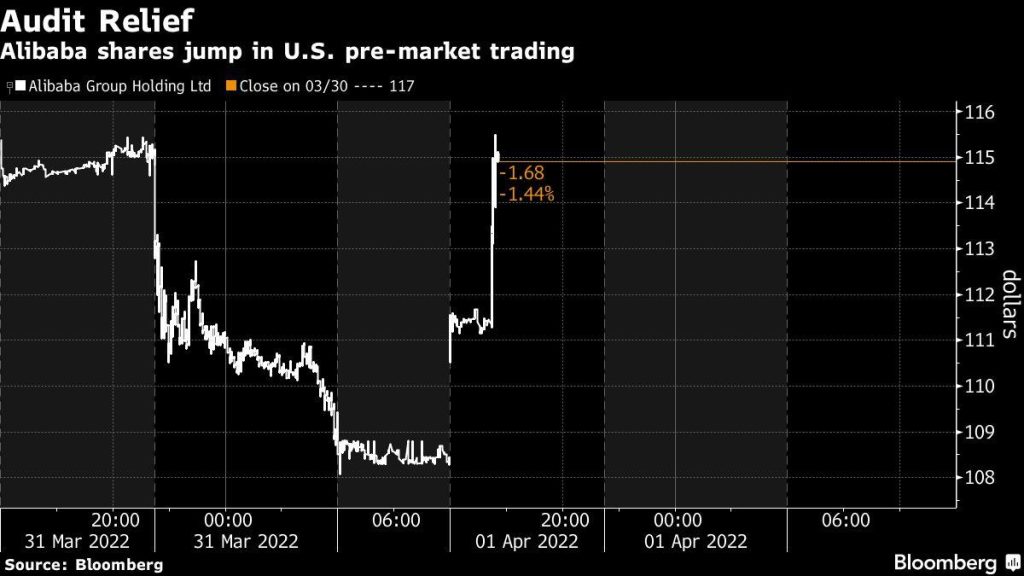(Bloomberg) — Chinese authorities are preparing to give US regulators full access to audit reports of the majority of the 200-plus companies listed in New York as early as the middle of this year, making a rare concession to prevent further decoupling between the world’s two largest economies.
Most Read From Bloomberg
People familiar with the process, who asked not to be named while discussing a private matter, said the China Securities Regulatory Commission and other national regulators are in the process of crafting a framework that would allow most Chinese companies to keep their listings. However, the government is willing to accept the write-off of some state-owned companies and private companies that have sensitive data, they said.
People said the framework is expected to provide clarification on data that may raise national security concerns. One person said regulators were discussing whether companies that handle consumer information, such as Alibaba Group Holding Ltd., would automatically fall into this category, adding that processing large amounts of such information would not necessarily make the company a security concern.
If the plan goes ahead, it would be an extraordinary reversal by Beijing, potentially ending a decades-old dispute that escalated when the United States imposed a 2024 deadline to expel non-compliant companies from the New York Stock Exchange and Nasdaq. The settlement will also demonstrate China’s willingness to balance national security concerns with the needs of investors and businesses at a time when its economy faces many challenges.
Shares of Chinese companies in pre-market trading in US Alibaba shares rose 5.8% in pre-market trading, JD.com shares rose 4%, Pinduoduo shares rose 7.9%, Didi Global shares jumped more than 18%. The Nasdaq Golden Dragon index posted its worst quarter since 2008 on concerns about audit disputes, regulatory crackdowns and economic growth.
The details are still being discussed and may change, the people said, adding that it also needs approval from the top leadership. One person said that Chinese regulators hope to reach a deal with the United States around the summer.
However, the CSRC has repeatedly issued a more optimistic tone about the possibility of a deal from its US counterpart. Securities and Exchange Commission Chairman Gary Gensler this week toned down speculation that a solution was imminent, noting that only full compliance with audit inspections would allow companies to continue trading in US markets.
Gensler said in an interview that China could simply move a company to a non-US exchange if it wanted to protect financial documents. He also noted that US law focuses on non-compliant countries rather than specific companies. So if a request is blocked, it means that the request has not been met.
In a statement emailed to Bloomberg News, the CSRC said regulators from both sides are in active talks on auditing cooperation, and progress has been generally smooth, adding that all details of the negotiations will be subject to public statements from both parties.
Washington and Beijing have been at odds for two decades over the mandate to give all publicly traded companies in the United States access to audit working papers. The case prompted action on Capitol Hill at the end of the Trump administration, when US lawmakers demanded the delisting of non-compliant companies. The law particularly threatens companies based in China and Hong Kong because Beijing has refused to grant access to corporate audits, citing national security concerns.
The Chinese government has made initiatives over the past few years to allow some US audit reviews, but the US has remained steadfast in its demands that US inspectors be able to enter a foreign accounting firm and demand audits of all companies that do business in the US.
There are more than 200 Chinese companies listed in the United States as US depository stocks, with a combined market value of $2.1 trillion as of May 2021, including eight nationally owned enterprises, according to a report by the US government. The Nasdaq Golden Dragon China Index of US-listed companies has fallen more than 50% over the past year.
The SEC last month published a “tentative list” of companies that could face removal. While the move has long telegraphed, it fueled a sharp decline in US stocks for companies based in China and Hong Kong. The latest update to the listing included Baidu Inc. and Futu Holdings Limited and Nocera Inc. and iQIYI Inc. and CASI Pharmaceuticals Inc. All of the more than 200 companies are expected to end up on the list unless an agreement is reached between regulators.
One person said the draft framework would also address the approval process for offshore listing, including the rules governing the so-called changing interested entities, or VIE structure.
China unveiled sweeping regulations governing overseas stock sales by its companies in December, and took one of its biggest steps to tighten oversight of international debuts in the wake of the controversial listing by Didi Global Inc. The offers, which have virtually gone unchecked for two decades and brought in billions of dollars in profits for US investment banks.
(Updates with CSRC comment in ninth paragraph.)
Most Read Bloomberg Businessweek
© Bloomberg LP 2022

“Twitter practitioner. Beer evangelist. Freelance gamer. Introvert. Bacon aficionado. Webaholic.”











More Stories
Asian stocks slide as Fed hike fears push Wall Street into a bear market
Dow Jones plunges 900 points, S&P enters bear market as inflation fears escalate
Bitcoin Price: Percentage Trading Paused, Binance Pausing Some Withdrawals